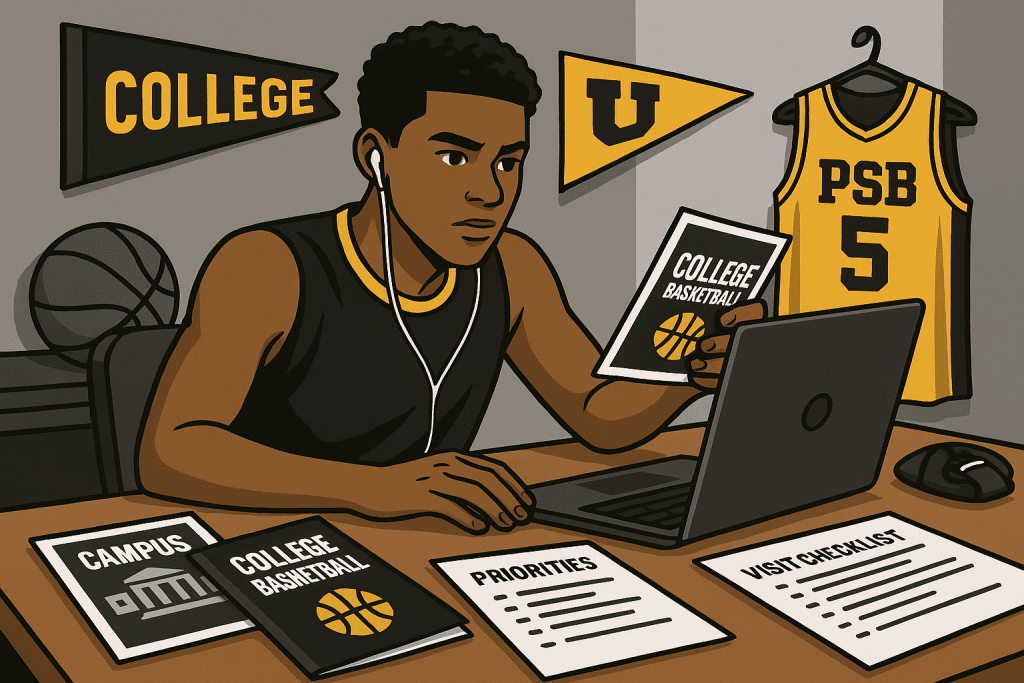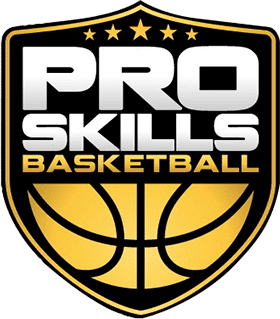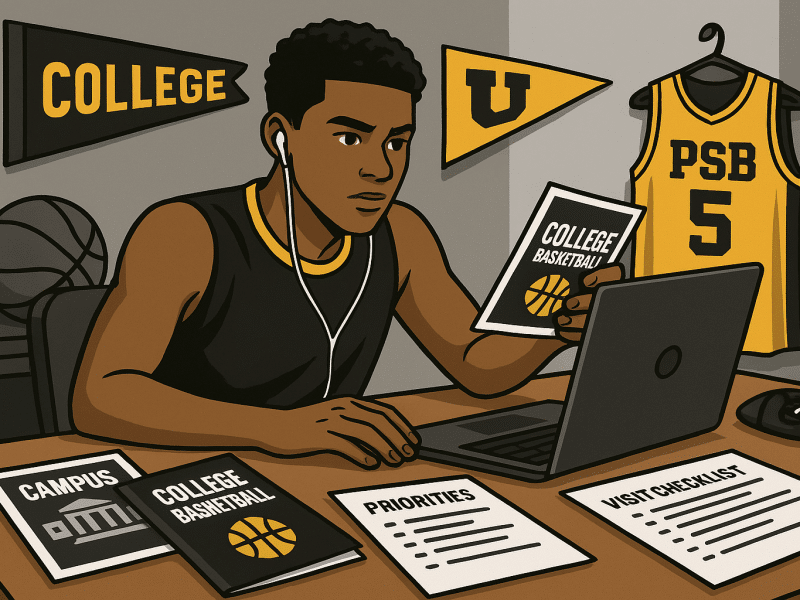
How to Choose the Right College Basketball Program: Dos & Don’ts for High School Players
As summer winds down, it’s time for high school basketball players to start seriously considering their future—and that includes where they want to play college basketball.
Maybe new programs have reached out. Maybe you’ve realized your path might lead to DII, DIII, NAIA, or JUCO instead of DI. Or maybe you just know you want to keep playing and developing at the next level.
At Pro Skills Basketball (PSB), we’ve guided hundreds of players and families through the college basketball recruiting process. Choosing the right program isn’t just about basketball—it’s about finding the best fit for your education, values, goals, and long-term growth.
Here’s our list of Dos and Don’ts to help you make a confident and informed decision when it comes to your college basketball journey.
✅ The Dos of Choosing a College Basketball Program
1. List Your Priorities
We can’t stress this enough: what matters to you should drive your decision.
-
Do you want to study engineering, business, or another specific major?
-
Do you care more about early playing time or competing at the highest level?
-
Is staying close to home important, or are you excited to explore somewhere new?
-
Do you prefer a smaller campus community or the energy of a big university?
-
What type of coach or team culture do you thrive in?
Write it all down. Defining your non-negotiables and preferences will help you evaluate opportunities more clearly and stay focused on what truly matters—not just hype or external pressure.
2. Ask for Help
The recruiting process can be complex and overwhelming. With countless schools, divisions, timelines, and NCAA rules, it’s easy to feel lost.
That’s why it’s essential to lean on trusted mentors—coaches, former players, and people who’ve been through it. Your PSB coach or director can offer honest insight into what level might be the best fit and which programs are worth pursuing.
You don’t have to go through it alone. Ask questions, seek feedback, and use your support system.
3. Do Your Research
Sometimes the best fit is a school you’ve never heard of.
Don’t automatically write off DIII, NAIA, or junior college programs. Many offer excellent academics, competitive basketball, and real development opportunities. And mid-major DI or strong DII programs may provide more meaningful minutes and a better overall college experience than sitting the bench at a Power 5 school.
Do your homework:
-
Visit school and athletics websites
-
Watch game film
-
Read up on the coaching staff
-
Connect with current players
-
Explore the campus, virtually or in person
And whenever possible—visit in person. Nothing compares to stepping on campus, attending a practice, and experiencing the vibe for yourself.
View this post on Instagram
❌ The Don’ts of Choosing a College Basketball Program
1. Don’t Skip the Visit
We get it—traveling takes time and money. But skipping a campus visit could lead to regrets.
A school might look great on Instagram or sound impressive in a phone call, but you won’t really know until you walk around campus, meet the team, and see the facilities.
Talk to current players, sit in on a class, tour the locker room, and—most importantly—spend face-to-face time with the coaching staff. These are the people you’ll be around every day. Make sure it’s a good fit.
2. Don’t Choose Based on Others’ Opinions
It’s tempting to chase DI offers just to impress others—or to pick a school because your parents want it.
But this is your journey.
You’re the one who will live the experience: balancing schoolwork, early lifts, late practices, and long road trips. Prioritize your goals and personality, not someone else’s expectations.
3. Don’t Fall for False Promises
Some coaches are great recruiters—but that doesn’t always translate into follow-through.
If someone promises you a starting role as a freshman or says you’re the “missing piece,” take it with a grain of salt. Recruitment is sales. Once the season starts, everything changes.
Ask tough questions:
-
What role do they see you playing realistically?
-
How many players are at your position?
-
What’s the team’s style and rotation like?
Get it in writing if possible, and trust your gut. You’re not just committing to a program—you’re committing to a culture, staff, and vision.
🎓 Final Thoughts: College Basketball is About Fit, Not Flash
Choosing where to play college basketball is a major life decision. It deserves serious thought, open conversations, and careful planning.
At Pro Skills Basketball, we believe in helping players develop not just as athletes—but as students and people. We support players at every level, from DI to DIII, JUCO to NAIA, and everywhere in between.
Remember: it’s not about chasing the biggest name. It’s about finding the right fit for your future.
View this post on Instagram
Ready to take the next step in your child’s basketball journey?
Pro Skills Basketball offers Club Teams, Camps, Clinics, and Academies in 25+ cities across the U.S.
👉 Find your city and sign up today to join a program focused on real development, experienced coaches, and a culture that puts players first.
📩 Contact us at admin@proskillsbasketball.com
📞 Call us at 866-996-3888



